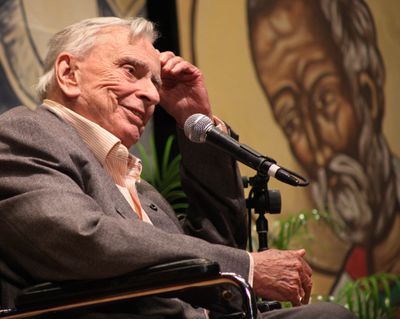Writer Gore Vidal dies at 86
Author was prolific, versatile, acerbic

LOS ANGELES – Gore Vidal, the author, playwright, politician and commentator whose novels, essays, plays and opinions were stamped by his immodest wit and unconventional wisdom, died Tuesday at age 86, his nephew said.
Vidal died at his home in the Hollywood Hills about 6:45 p.m. of complications from pneumonia, Burr Steers said. Vidal had been living alone in the home and had been sick for “quite a while,” he said.
Along with such contemporaries as Norman Mailer and Truman Capote, Vidal was among the last generation of literary writers who were also genuine celebrities – fixtures on talk shows and in gossip columns, personalities of such size and appeal that even those who hadn’t read their books knew who they were.
His works included hundreds of essays; the best-selling novels “Burr,” “Lincoln” and “Myra Breckenridge”; the groundbreaking “The City and the Pillar,” among the first novels about openly gay characters; and the Tony-nominated play “The Best Man,” revived on Broadway in 2012.
Tall and distinguished looking, with a haughty baritone not unlike that of his conservative arch-enemy William F. Buckley, Vidal appeared cold and cynical on the surface. But he bore a melancholy regard for lost worlds, for the primacy of the written word, for “the ancient American sense that whatever is wrong with human society can be put right by human action.”
Vidal was uncomfortable with the literary and political establishment, and the feeling was mutual. Beyond an honorary National Book Award in 2009, he won few major writing prizes, lost both times he ran for office and initially declined membership into the American Academy of Arts and Letters, joking that he already belonged to the Diners Club. (He was eventually admitted, in 1999).
But he was widely admired as an independent thinker – in the tradition of Mark Twain and H.L. Mencken – about literature, culture, politics and, as he liked to call it, “the birds and the bees.” He picked apart politicians, living and dead; mocked religion and prudery; opposed wars from Vietnam to Iraq and insulted his peers like no other, once observing that the three saddest words in the English language were “Joyce Carol Oates.” (The happiest words: “I told you so”).
Vidal had an old-fashioned belief in honor, but a modern will to live as he pleased.
Vidal was fond of drink and alleged that he had sampled every major drug, once. He never married and for decades shared a scenic villa in Ravello, Italy, with companion Howard Austen.
Vidal would say that his decision to live abroad damaged his literary reputation in the United States. In print and in person, he was a shameless name dropper, but what names! John and Jacqueline Kennedy. Hillary Clinton. Tennessee Williams. Mick Jagger. Orson Welles. Frank Sinatra. Marlon Brando. Paul Newman and Joanne Woodward. Tim Robbins and Susan Sarandon.
Vidal dined with Welles in Los Angeles, lunched with the Kennedys in Florida, clowned with the Newmans in Connecticut, drove wildly around Rome with a nearsighted Williams and escorted Jagger on a sightseeing tour along the Italian coast. He campaigned with Eleanor Roosevelt and Harry Truman. He butted heads, literally, with Mailer. He helped director William Wyler with the script for “Ben-Hur.” He made guest appearances on everything from “The Simpsons” to “Rowan and Martin’s Laugh-In.”
A longtime critic of American militarism, Vidal was, ironically, born at the United States Military Academy in West Point, N.Y., his father’s alma mater. Vidal grew up in a political family. His grandfather, Thomas Pryor Gore, was a U.S. senator from Oklahoma. His father, Gene Vidal, served briefly in President Franklin Roosevelt’s administration and was an early expert on aviation.